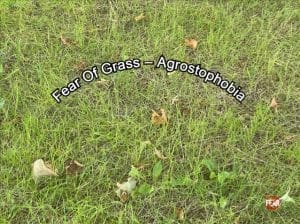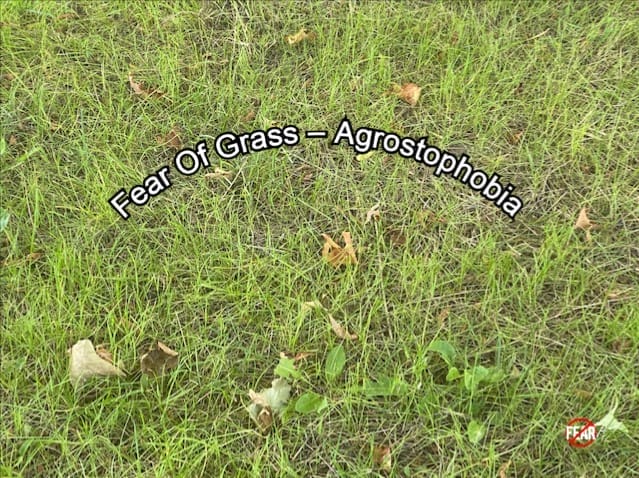Share This Article
Let’s Cut Through the Fear of Grass
Scared of grass touching your skin? Terrified of the insects and bacteria that lurk in the grass?
Does the thought of getting stuck in tall grass get your heart racing? Do you have nightmares of grass creeping all the way up your body till it clogs your throat?
You may have agrostophobia, a fear of grass. This fear can affect your everyday life, preventing you from going on family trips or picnics due to your fear of walking barefoot on grass. However, you can learn to better cope with your fear or possibly even overcome it with the right help.

Agrostophobia Causes
Can you be afraid of grass? There’s nothing in particular to be afraid of about grass aside from maybe the insect bites or allergy symptoms. But for some, these kinds of encounters have the potential to set off a grass phobia. Unfortunate grass-related events which cause someone to suffer—such as stepping on a bee in the yard—can trigger an intense fear of the lawn.
Is Agrostophobia a Phobia of Fear or Disgust?
Agrostophobia may also stem from witnessing a family member’s fear of grass. You may also acquire the genetic tendency to develop a phobia if people around you struggled with other kinds of phobias.
Some Things You Should Know about Agrostophobia
Phobias are irrational, but they can be life-changing and alter the quality of your life.
The term agrostophobia is derived from the Greek word agrostis, which means type of grass. It is sometimes called hastenburaphobia and is a phobia of grass.
Agrostophobia is a subset of botanophobia, or the fear of plants, because grasses are plants. It primarily affects young children, although it also affects older children.
The most common triggers of this phobia include getting stabbed by blades of grass, stepping on grass, or getting bitten by grass bugs.
Individuals with agrostophobia may not necessarily feel the need for treatment, since they can simply avoid the source of their anxiety. This offers those suffering from agrostophobia a sense of control over the situation.
However, avoiding grass is not always practical or sufficient, as we may often need to be part of social situations that require us to be around grass.
Symptoms of Agrostophobia
Phobias should be taken seriously, no matter how weird or trivial they seem. Ignoring a phobia may result in serious complications like anxiety and depression.
Knowing how to overcome your phobia will not only give you more confidence, but it will also equip you with the right tools to help others with similar phobias.
People who are afraid of grass often deliberately avoid making contact with it. This may appear to be a simple fix, but as previously stated, if you don’t fully understand where the fear stems from, what you are feeling may begin to hinder your life down the road.
The seriousness of the symptoms varies depending on the person and their experiences. People may experience a range of physical and psychological symptoms.
Physical Symptoms
The physical symptoms that accompany agrostophobia include:
- Feeling like fainting
- Vomiting
- An urge to use the washroom
- Sweating and trembling
- Increase in blood pressure
- Dry mouth
- Hyperventilation
Psychological Symptoms
- Fear of harm or illness
- Shame, guilt, and self-blame
- Withdrawing from social interaction
- Fear of dying
- Anxiety and anger
- Confusion, mood swings, and depression
- Feelings of dread
Agrostophobia Treatment
Treatment for any phobia is vital, and the sooner you receive treatment the better. When phobias become serious, it’s difficult to resolve them. After you’ve uncovered your fear of grasses, you should seek help. Whether it’s professional therapy or self-help, start as early as possible.
Like all phobias, agrostophobia is on the list of irrational fears. The good news is that most phobias are treatable. Though there is no single method used to treat each phobia, you can still explore the common options that work for phobias in general.
Self-Help: What Can You Do to Help Yourself?
The first step to helping yourself is acknowledging your fear. Say to yourself, “I fear grass.” Self-help is one of the best ways to help yourself, as you know how grass makes you feel and why you fear it. You can start your self-help journey by reassuring yourself that the fear is irrational.
You can also practice relaxation techniques like deep breathing exercises and yoga that will help you stay calm when in the presence of the source of your fear.
Talking to a trusted family member or friend can help alleviate your anxiety. Joining a support group and hearing from people with similar fears can help you learn more about your fear and overcome it.
Exposing yourself to the thing you dread is a courageous alternative. Of course, it is easier said than done, but as you gradually get used to the source of your phobia, you will eventually stop fearing it.
Professional Help
Talk Therapy
Talk therapies are very effective to help you understand and resolve phobias. They would be a great start for your fear of grass. Talk therapies are laid back and don’t require anything other than you communicating your feelings to an professional psychologist or therapist.
Talk therapy aims to:
- Help you identify and change problematic patterns in your thinking or behavior.
- Help you resolve complex feelings or find strategies to cope with them.
- Help you make sense of things and understand yourself better.
Cognitive Behavioral Therapy
Cognitive behavioral therapy seeks to determine whether your fear is an accurate representation of reality. You can then begin to identify irrational thought and behavior patterns. It then attempts to replace these with healthier thought and behavioral patterns.
Learning to Cope with Agrostophobia
Although there is no permanent cure for phobias, you can manage them with some self-help techniques or with the assistance of a specialist.
You can confide in a friend or family member you trust, so they may be able to support you through your journey of recovery. You may also join online communities and connect with people in similar situations.
Finding support and knowing that you are not alone can help you better cope with agrostophobia.
In Conclusion
In the long run, learning to manage your agrostophobia can help you lead a more fulfilling life. You may find yourself strolling into your friend’s yard one day and laugh when you realize you haven’t panicked despite just stepping on grass!




